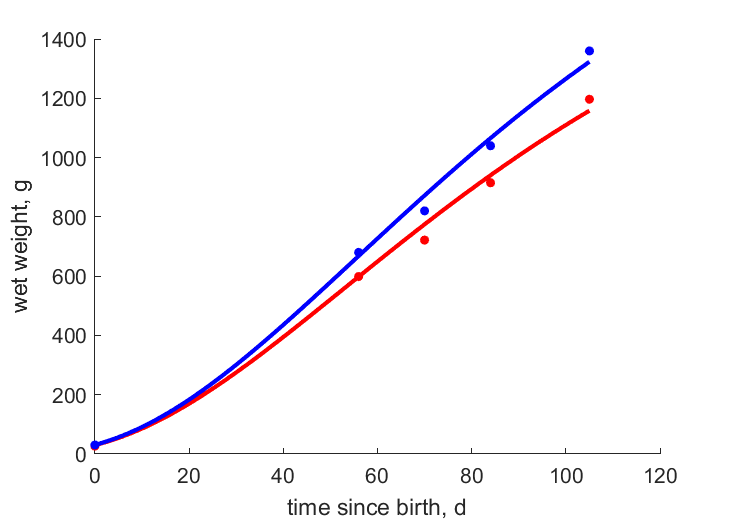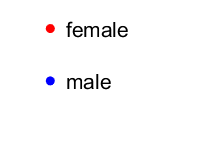Predictions & Data for this entry
| Model: stx | climate: Cfb, Dfb, Dsb | migrate: | phylum: |
| COMPLETE = 2.5 | ecozone: THp | food: bxM, xiCv, xiCi | class: |
| MRE = 0.028 | habitat: 0iFm, 0iFl, 0iFr | gender: Dg | order: |
| SMSE = 0.001 | embryo: Tv | reprod: O | family: |
Zero-variate data
| Data | Observed | Predicted | (RE) | Unit | Description | Reference |
|---|---|---|---|---|---|---|
| tg | 28 | 28.16 | (0.005675) | d | gestation time | AnAge |
| tx | 59 | 63.25 | (0.07201) | d | time since birth at weaning | AnAge |
| tp | 456 | 470.8 | (0.03254) | d | time since birth at puberty for females | AnAge |
| tpm | 426 | 425.2 | (0.001914) | d | time since birth at puberty for males | AnAge |
| am | 6643 | 6606 | (0.005558) | d | life span | AnAge |
| Wwb | 30 | 31.27 | (0.04218) | g | wet weight at birth | MarkBass1942 |
| Wwx | 680 | 637.2 | (0.06294) | g | wet weight at weaning | AnAge |
| Wwi | 1600 | 1660 | (0.03727) | g | ultimate wet weight | Wiki |
| Ri | 0.00274 | 0.002825 | (0.03121) | #/d | maximum reprod rate | AnAge |
Uni- and bivariate data
| Data | Figure | Independent variable | Dependent variable | (RE) | Reference |
|---|---|---|---|---|---|
| tW_f |   | time since birth | wet weight | (0.03474) | MarkBass1942 |
| tW_m |   | time since birth | wet weight | (0.03227) | MarkBass1942 |
Pseudo-data at Tref = 20°C
| Data | Generalised animal | Martes martes | Unit | Description |
|---|---|---|---|---|
| v | 0.02 | 0.1522 | cm/d | energy conductance |
| p_M | 18 | 199.7 | J/d.cm^3 | vol-spec som maint |
| k_J | 0.002 | 0.002 | 1/d | maturity maint rate coefficient |
| k | 0.3 | 0.07835 | - | maintenance ratio |
| kap | 0.8 | 0.9688 | - | allocation fraction to soma |
| kap_G | 0.8 | 0.8021 | - | growth efficiency |
| kap_R | 0.95 | 0.97 | - | reproduction efficiency |
| t_0 | 0 | 18.14 | d | time at start development |
Discussion
- Males are assumed to differ from females by {p_Am} and E_Hp only
- Body temperarie from Neovison
- mod_1: males have equal state variables at b, compared to females
Facts
- The implantation can be delayed and extend the gestation time up to one year. (Ref: AnAge)
Bibliography